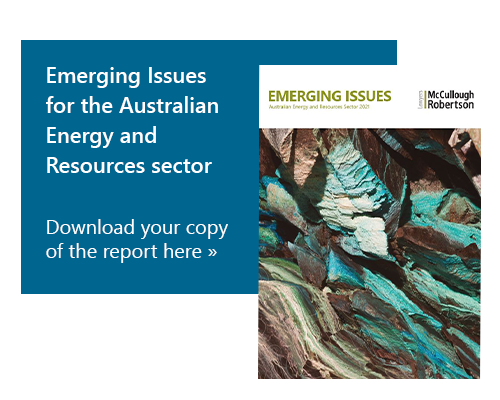Recent FIRB reforms have confirmed what the market already knew – that the Australian government considers secure access to critical minerals an issue of national interest and national security concern.
Over the last few years, media reports and government announcements have consistently referred to the importance of critical minerals and their role in the technological advancements necessary to manage and abate climate change.
“Critical minerals” is a generic term often used to refer to minerals such as lithium, graphite, cobalt, vanadium, scandium, copper, nickel and rare earth elements, each increasingly an essential component in technologies such as solar panels, wind turbines, batteries, electric vehicles, and other low emissions technology.
The importance of critical minerals has only increased with the Federal Government’s Technology Roadmap announcement in 2020, which put technological advancement as the centrepiece of Australia’s climate change response. This focus from all levels of government has been welcomed by the critical minerals sector but is not without consequences from a regulatory point of view, in particular, Foreign Investment Review Board (FIRB) compliance.
Reforms to Australia’s foreign investment framework which took effect on 1 January 2021, along with a number of decisions FIRB made or declined to make in the last 18 months, have demonstrated to the market that ownership and control of critical mineral deposits are an issue of both national interest and national security for Australia.
Inbound foreign investors into Australia or, indeed, companies with a connection to Australia’s critical mineral sector, must consider their FIRB obligations now more than ever. Prospective foreign investors must turn their mind to requirements under Australia’s foreign investment regime both prior to proceeding with a transaction and, on account of recent reforms, for some time after completion of the transaction.
What is a critical mineral and what has FIRB done to date?
Critical minerals are described differently across jurisdictions but are generally understood to refer to mineral or metal elements which are critical to the development of future technologies, such as those mentioned above. The main geographic source of these minerals for the global economy is China, but over the last few years countries such as Australia and the United States of America have actively sought to diversify supply chains of critical minerals to manage the security risk of being over exposed to one export source in this area of technology which is recognised as having fundamental importance.
The increased scrutiny by FIRB in the critical minerals space pre-dates the most recent FIRB reforms. For example, in early 2020 Northern Minerals Limited, a holder of significant deposits of rare earth minerals, announced it had entered into a subscription agreement with a Chinese Government backed group, “Baogang Group Investment”. After a lengthy consideration of this FIRB application, FIRB rejected the proposed transaction.
Also in 2020, AVZ Minerals Limited (AVZ) faced difficulties with FIRB in its agreement with Yibin Tianyi Lithium Industry Co., Ltd (YTL), a Chinese company which was seeking to invest $14.1 million into AVZ which held lithium deposits. The deal was only allowed to proceed when YTL reduced its interest to $10.7 million. Interestingly, these deposits were not based in Australia but in the Democratic Republic of Congo. Notwithstanding, YTL’s proposed investment was subject to FIRB’s oversight due to AVZ being incorporated in Australia. This demonstrates the extent to which FIRB is willing to extend its oversight to ensure ownership of these minerals is not concentrated in a way that risks supply.
National security reforms
Prior to 1 January 2021, there was no differentiation of mineral classes for FIRB purposes. As a general rule, FIRB approval was required for the acquisition of a mining and production tenement by any type of investor but not for an exploration tenement. The exception to this rule was for foreign government investors who also required FIRB approval to acquire exploration tenements. With the introduction of the national security reforms on 1 January 2021, there are now different types of FIRB approval that will apply differently depending on the mineral being mined.
The 2021 FIRB reforms saw two new categories of FIRB actions introduced, each focusing on national security considerations. These are:
1. ‘notifiable national security action’ which has compulsory pre-notification requirements (regardless of deal value) for the acquisition or starting of a ‘national security business’ or acquisition of a direct interest in ‘national security land’; and
2. ‘reviewable national security action’ being an action which is not otherwise captured by the FIRB rules (i.e. is not a notifiable action, significant action or notifiable national security action) but may nevertheless raise national security concerns. This type of action does not trigger compulsory notification requirements, but FIRB will retain a power to ‘call in’ the transaction for review for 10 years after the action is taken. Where an action is called in, FIRB has the power to impose conditions and, in extreme cases, order the divestment of the investment.
While the scope of a ‘notifiable national security action’ is well defined, the likely practical application of the call in powers is much more subjective. To assist potential applicants in determining if there is a risk that their investment may be ‘called in’ for review, FIRB has released a guidance note with an explanation of those sectors that are likely to raise national security concerns.
National security and the critical mineral sector
The critical minerals sector has been identified by FIRB as an area in which FIRB encourages voluntary notification by prospective foreign investors under the ‘reviewable national security action’ rules. FIRB’s guidance specifically refers to increasing global demand, the importance of critical minerals to technology, their scarcity and their geographical concentration as key reasons for critical minerals raising national security concerns.
A foreign person wishing to acquire an interest in a critical mineral project, or an Australian company that has critical mineral projects, will need to consider whether holding any interest in the target asset would raise national security concerns. Factors to consider when assessing this risk would include the location and identity of ultimate owners of the investor, whether there is foreign government involvement, the total interest to be held and the project’s scale and stage of development.
Further, investors that are required to seek FIRB approval (e.g. because the target assets include mining and production tenements) or those that elect to seek FIRB approval to remove the ‘call in’ risk under a reviewable national security action application will need to be prepared for the potential imposition of significant conditions by FIRB. These may include FIRB seeking to ensure that the majority of directors reside in Australia, or even restrictions on supply or offtake arrangements in relation to the critical minerals produced.
How can this be managed?
As shown by the examples above, FIRB’s scope in this space is far-reaching and subjective. Each transaction requires technical analysis to confirm whether the proposed transaction may be caught by the FIRB rules, whether it may be ‘called-in’ or whether it can proceed in the usual course. These issues mentioned above are manageable with advanced engagement with FIRB prior to any proposed transaction, however one of the key risks for most investments will be a timing delay as a result of seeking FIRB’s approval.
Critical minerals will only grow in importance for the Australian and global economies, as low emissions technology solutions are implemented to grapple with climate change. This importance will only further push FIRB towards a conservative position when allowing any type of foreign investor to control key deposits of critical minerals. That said, the Australian resources sector has always relied on foreign capital and that is unlikely to change. Hopefully, as these projects become more commonplace and better understood, FIRB’s position will revert to its previous state – being alert but not alarmed.
Related insights
Emerging Issues for the Australian energy and resources industry 2021
Prepared by McCullough Robertson’s Resources & Renewables Industry Group, Emerging Issues highlights the legislative and policy developments over the past 12 months which will significantly affect the Australian energy and resources industry going forward, with a specific focus on the resource rich states in Australia.

